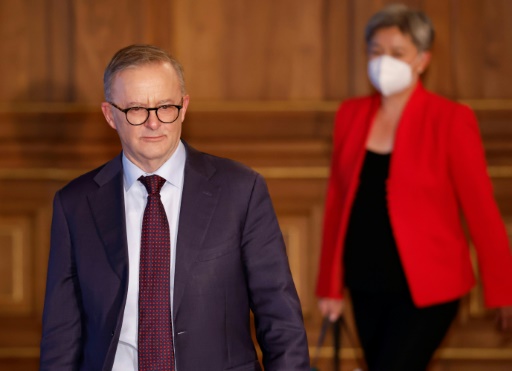Pacific nations 'very positive' on Australian re-engagement: PM

Australia's newly elected prime minister has said Pacific leaders have been "very positive" about his government's renewed engagement, even as Beijing continues its diplomatic blitz across the increasingly contested region.
The comments from Anthony Albanese -- aired Sunday in an interview with Sky News -- came as Chinese Foreign Minister Wang Yi visited Fiji for closely watched meetings with the island nation's leaders and other Pacific foreign ministers.Read More : Opposition party on track to win Australian election Wang, who began his South Pacific tour Thursday in Solomon Islands, is expected to discuss with his fellow foreign ministers a wide-ranging draft agreement and five-year plan, which was leaked last week. The leaked drafts, obtained by AFP, were circulated to at least 10 Pacific nations ahead of the Fiji meeting, sparking concern about Beijing’s ambitions to dramatically expand security and economic cooperation within the South Pacific.
Albanese was scathing in his assessment of the former Australian government's Pacific plan, saying it had "dropped the ball" in the region -- blaming both foreign aid cuts and "a non-engagement on values". "For our Pacific Island neighbors, the issue of climate change is an absolute national security issue," he said.
In addition to increased action on the environment, Albanese touted a boost in aid and a plan to set up a defense training school in the Pacific. During Australia's recent election campaign, Albanese's center-left Labor party said the school would involve forces from Papua New Guinea, Fiji, Tonga, Timor-Leste, Vanuatu and Solomon Islands.
Albanese said Australia's renewed diplomatic push in the Pacific, which began with a visit to Fiji by new Foreign Minister Penny Wong, had been well-received. "The response has been very positive," he said.
Australia and China have been locked in a tense duel for influence in the Pacific, after Beijing last month surprised Canberra by securing a wide-ranging security pact with the Solomon Islands.
Wong urged South Pacific nations to spurn China's attempts to extend its security reach across the region while in Fiji on Friday. "We have expressed our concerns publicly about the security agreement," Wong told reporters in the capital of Suva.
Chinese Foreign Minister Wang is expected to remain in Fiji's capital until at least Tuesday, meeting with the country's leaders and hosting the second China-Pacific Island Countries Foreign Ministers' meeting.
Wang met Sunday with Pacific Islands Forum Secretary-General Henry Puna, who said economic recovery from the pandemic and "urgent and ambitious climate change action" were key issues for their discussion. "We welcome China’s climate change commitments," Puna said.
Wang's whistle-stop tour of the Pacific previously took him to Kiribati, where he signed 10 memorandums of understanding covering climate change, economic cooperation and other issues -- although a security agreement was not among them. He also visited Samoa, where he signed a bilateral agreement on Saturday promising "greater collaboration". Wang is expected to visit Tonga, Vanuatu and Papua New Guinea to round out his tour.
The comments from Anthony Albanese -- aired Sunday in an interview with Sky News -- came as Chinese Foreign Minister Wang Yi visited Fiji for closely watched meetings with the island nation's leaders and other Pacific foreign ministers.
Albanese was scathing in his assessment of the former Australian government's Pacific plan, saying it had "dropped the ball" in the region -- blaming both foreign aid cuts and "a non-engagement on values". "For our Pacific Island neighbors, the issue of climate change is an absolute national security issue," he said.
In addition to increased action on the environment, Albanese touted a boost in aid and a plan to set up a defense training school in the Pacific. During Australia's recent election campaign, Albanese's center-left Labor party said the school would involve forces from Papua New Guinea, Fiji, Tonga, Timor-Leste, Vanuatu and Solomon Islands.
Albanese said Australia's renewed diplomatic push in the Pacific, which began with a visit to Fiji by new Foreign Minister Penny Wong, had been well-received. "The response has been very positive," he said.
Australia and China have been locked in a tense duel for influence in the Pacific, after Beijing last month surprised Canberra by securing a wide-ranging security pact with the Solomon Islands.
Wong urged South Pacific nations to spurn China's attempts to extend its security reach across the region while in Fiji on Friday. "We have expressed our concerns publicly about the security agreement," Wong told reporters in the capital of Suva.
Chinese Foreign Minister Wang is expected to remain in Fiji's capital until at least Tuesday, meeting with the country's leaders and hosting the second China-Pacific Island Countries Foreign Ministers' meeting.
Wang met Sunday with Pacific Islands Forum Secretary-General Henry Puna, who said economic recovery from the pandemic and "urgent and ambitious climate change action" were key issues for their discussion. "We welcome China’s climate change commitments," Puna said.
Wang's whistle-stop tour of the Pacific previously took him to Kiribati, where he signed 10 memorandums of understanding covering climate change, economic cooperation and other issues -- although a security agreement was not among them. He also visited Samoa, where he signed a bilateral agreement on Saturday promising "greater collaboration". Wang is expected to visit Tonga, Vanuatu and Papua New Guinea to round out his tour.
Source: japantoday.com
